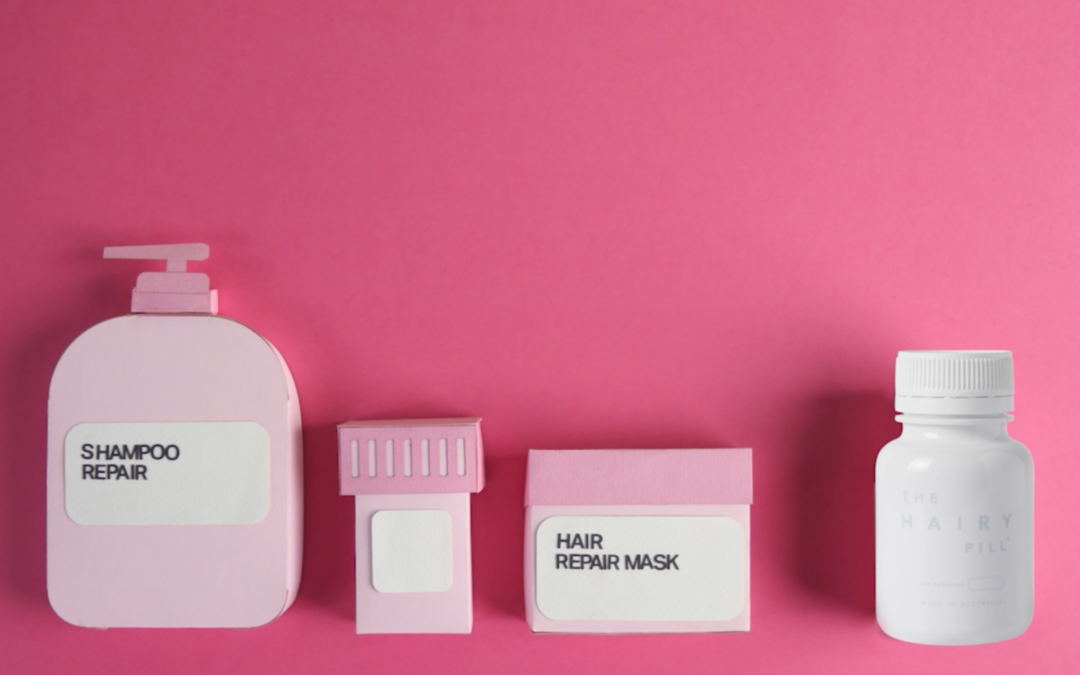Hair Growth Supplements vs Medication
Walk into any pharmacy and you’ll find shelves stocked with bottles of hair growth supplements promising a healthy head of hair.
It’s natural to wonder if it’s really that easy. An off-the-shelf vitamin and mineral supplement you can pop once a day for a thick mop on top?
We welcome the scepticism. After all, these supplements don’t contain the active ingredients that are proven to stop hair loss and stimulate hair growth.
So let’s take a look at the science behind hair growth supplements and see if they’re really all they’re cracked up to be.
While we’re here, we’ll look at how hair loss supplements measure up against our hair loss treatment — researched, tested, refined, and patented but still just one pill, taken daily.
What Are Hair Growth Supplements?
Hair growth supplements are usually made up of a combination of vitamins and minerals believed to play a role in non-scarring alopecia or hair loss.
You can usually find these supplements in any pharmacy and even down the health aisles of your local supermarket.
While these supplements for hair growth don’t usually contain active ingredients, they may contain vitamins and minerals to address potential deficiencies that may contribute to hair loss or brittle hair.
Common Hair Growth Supplements
The list of hair growth supplements is about as long as Rapunzel’s braid and, like her tresses, it keeps growing.
But most are made up of the same vitamin and mineral supplements. Let’s take a look at some of the most common supplements below and see how they really shape up in the medical research and trials.
B Vitamins
Of the 8 specific vitamins included in the B vitamin complex, only riboflavin, biotin, folate, and vitamin B12 deficiencies may be linked to hair loss. Since each of these has different effects in the trials, we’ll look at them individually.
Riboflavin supplements
While links have been made between riboflavin (also known as B2) deficiency and hair loss, there’s still not enough data to recommend riboflavin supplements for hair growth.
Biotin supplements
Biotin is one of the most popular supplements taken for hair, skin, and nails but most people shouldn’t need them.
Biotin deficiency is rare; the body only needs a small amount of biotin and should produce adequate levels if you eat a varied and balanced diet.
The side effects for biotin supplements may include skin rashes, digestive upset, trouble sleeping, and kidney problems.
Supplements may even be harmful if you take too much — and many biotin supplements exceed the recommended daily intake of biotin.
Folate and B12 supplements
B12 deficiency can be common, especially in those following a vegan diet or in older adults. Folate deficiencies are more rare but may occur in those with restrictive diets.
Many studies have found no big difference in the levels of folate and B12 in people with androgenic alopecia and those without, so there’s not yet enough information to support the use of folate or B12 supplements for hair growth.
Vitamin C
Vitamin C, also called ascorbic acid, is a powerful antioxidant that protects the hair from oxidative stress, which has been linked to hair loss.
It also helps synthesise collagen (which contains amino acids that build keratin — important for hair structure).
While there are no direct links between vitamin C deficiency and hair loss, it’s worth noting that vitamin C helps the body absorb iron — and the relationship between iron deficiency and hair loss is well known (see below).
This means if your hair loss is associated with iron deficiency, your vitamin C levels will be equally important — and supplements may help with iron absorption.
Vitamin D
Studies have shown that alopecia areata (an autoimmune hair loss condition) may be associated with low levels of vitamin D in the body.
Vitamin D has also been found to have an anti-inflammatory and immunoregulatory effect on the body, which means vitamin D supplements may help with alopecia areata treatment if you also have a vitamin D deficiency.
Iron
Iron deficiency is the most common deficiency in the world and is particularly high in females.
Studies have produced mixed results when it comes to the links between iron deficiency and hair loss, although some links have been found between low iron levels and telogen effluvium (hair loss caused by stress) in women.
If you have androgenic alopecia or telogen effluvium and have also reported low iron levels, iron supplements are generally recommended.
If you have an iron deficiency or are taking supplements, you may also need vitamin C supplements to help with iron absorption.
Always speak with your doctor if you’re unsure about starting new supplements.
Zinc
It’s been well known that zinc deficiency plays a role in many types of hair loss, although the research remains inconclusive on whether supplements can improve hair growth.
Some studies have proven the correlation between low levels of zinc and hair loss while documented cases have shown that zinc supplements may improve hair growth.
Hair Loss Medication for Men & Women
The main difference between hair growth supplements and hair loss medication is that medication typically contains active ingredients proven to treat hair loss.
Take The Hairy Pill®. There’s no junk science here.
Along with a blend of vitamins, essential elements, and amino acids designed specifically for your health, The Hairy Pill® contains one or two active ingredients (depending on the patient) clinically proven to treat hair loss at its roots.
One active ingredient puts a handbrake on your hair loss, preventing your hair from falling out. The other can both stop hair loss and stimulate your hairs to regrow.
The benefit of The Hairy Pill® treatment is that it’s backed by science and over 30 years of research. Learn more about how it works here.
The Benefits of a Personalised Hair Loss Treatment Plan
The Hairy Pill® goes three steps further than most hair loss medications.
Tailored to Your Hair Loss Needs
The bottle of The Hairy Pill® that is delivered directly to your door contains pills that have been made (compounded) by a local Australian pharmacist just for you, according to your hair loss needs and sensitivities.
The Hairy Pill® treatment has specific formulations for men and for women, with doses and ingredients that the pharmacist can adjust based on your progress and the doctor’s recommendations.
Patented Technology with Expert Doctor Support
The Hairy Pill® uses underlying technology invented by world-renowned dermatologist and hair loss expert Professor Rodney Sinclair.
This technology has been researched, tested, refined and patented. It’s now been prescribed to well over 20,000 patients in Australia, both in-person through Professor Sinclair’s Melbourne clinic and online through The Hairy Pill®.
We have more than 10 doctors ranging from GPs to dermatologists and specialist oncologists, who have trained under Professor Sinclair and are able to give you the answers you need in your hair loss journey.
Regular Consultations
To make sure you’re getting the right treatment for your hair loss, The Hairy Pill® provides regular check-ins with Australian doctors at no extra charge.
These consultations, which happen every 3 months and can also be requested at any point in time at no additional charges, are an opportunity to have any questions answered and to change your dose over time to fit your response to the medication and results.
Get Treatment for Hair Loss Today
It might be tempting to throw some hair growth supplements into your trolley on your next visit to Woolies in the hopes that they might work.But why not try The Hairy Pill® instead? The underlying technology has been clinically proven and is even easier to access. You can leave your car keys on the hook — all you need is five minutes to fill out one online form. Get started now.





